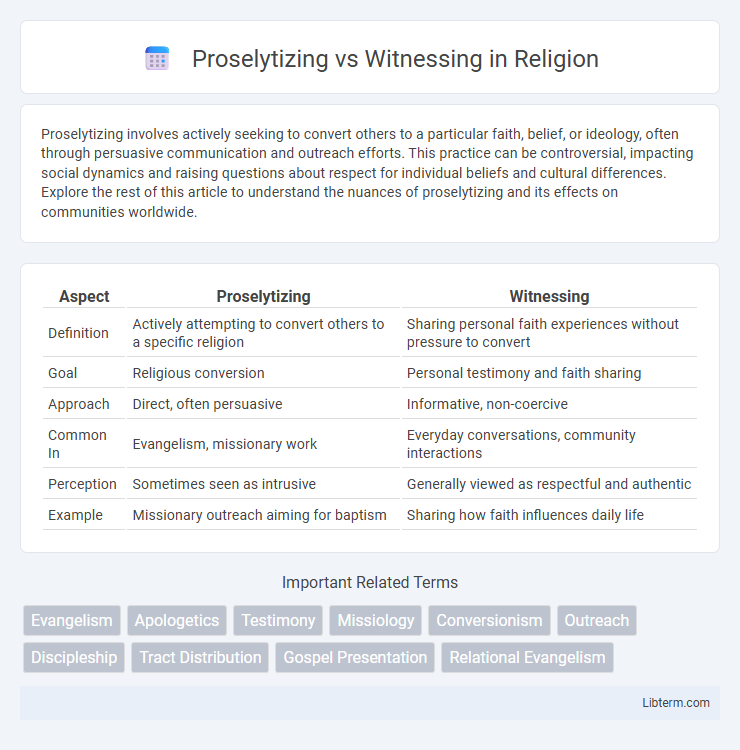Proselytizing involves actively seeking to convert others to a particular faith, belief, or ideology, often through persuasive communication and outreach efforts. This practice can be controversial, impacting social dynamics and raising questions about respect for individual beliefs and cultural differences. Explore the rest of this article to understand the nuances of proselytizing and its effects on communities worldwide.
Table of Comparison
| Aspect | Proselytizing | Witnessing |
|---|---|---|
| Definition | Actively attempting to convert others to a specific religion | Sharing personal faith experiences without pressure to convert |
| Goal | Religious conversion | Personal testimony and faith sharing |
| Approach | Direct, often persuasive | Informative, non-coercive |
| Common In | Evangelism, missionary work | Everyday conversations, community interactions |
| Perception | Sometimes seen as intrusive | Generally viewed as respectful and authentic |
| Example | Missionary outreach aiming for baptism | Sharing how faith influences daily life |
Understanding Proselytizing: Definition and Origins
Proselytizing refers to the active effort to convert someone from one belief, religion, or ideology to another, often involving persuasive communication techniques. The term originates from the Greek word "proselytos," meaning "a newcomer" or "convert," historically used in religious contexts such as early Christianity and Judaism. Understanding proselytizing requires examining its role in spreading faith traditions, where the emphasis is on changing beliefs rather than merely sharing personal experiences.
What Does Witnessing Mean in Faith Contexts?
Witnessing in faith contexts refers to sharing personal beliefs and spiritual experiences to inspire or encourage others without pressure or coercion. It emphasizes authentic expression and living out one's faith as a testimony to others. Unlike proselytizing, witnessing fosters open dialogue and respects individual choice in matters of faith.
Key Differences Between Proselytizing and Witnessing
Proselytizing involves actively attempting to convert others to a specific religion or belief system, often with the goal of increasing the number of adherents. Witnessing, on the other hand, emphasizes sharing personal faith experiences and beliefs without the primary intent of conversion, fostering open dialogue and understanding. The key difference lies in proselytizing's persuasive intent versus witnessing's focus on testimony and personal expression.
Historical Perspectives: How Approaches Have Evolved
Proselytizing historically involved aggressive efforts to convert others, often linked with colonial and imperial agendas, leading to resistance and cultural conflict. Witnessing emerged as a more relational and respectful approach, emphasizing personal testimony and example rather than direct persuasion. Over time, this shift reflects changing attitudes toward religious freedom, intercultural dialogue, and ethical evangelism practices.
Motivations Behind Proselytizing and Witnessing
Proselytizing is driven primarily by a desire to convert others to a specific faith, emphasizing evangelism and spreading religious doctrine. Witnessing focuses on sharing personal experiences and beliefs, aiming to inspire or encourage others through testimony rather than overt conversion efforts. Motivations behind proselytizing often include obedience to religious mandates, while witnessing is motivated by authentic expression and relational connection.
Effects on Communities: Building Bridges or Barriers?
Proselytizing often creates barriers within communities by emphasizing conversion and sometimes fostering resistance or tension among differing belief systems. Witnessing, in contrast, tends to build bridges by sharing personal experiences and fostering open, respectful dialogue that encourages mutual understanding. These differing approaches significantly impact social cohesion, with witnessing promoting inclusivity and proselytizing risking division.
Ethical Considerations in Sharing Beliefs
Proselytizing often raises ethical concerns due to its assertive nature, which can pressure individuals into adopting beliefs without fully informed consent, potentially violating personal autonomy and respect. Witnessing emphasizes sharing personal experiences and beliefs respectfully, allowing others to explore faith voluntarily, promoting dignity and open dialogue. Ethical sharing of beliefs requires sensitivity to cultural differences, informed consent, and fostering genuine understanding rather than coercion or manipulation.
Psychological Impact on Recipients
Proselytizing often triggers defensive psychological responses in recipients, including resistance and cognitive dissonance, due to its direct attempt to convert beliefs. Witnessing, by contrast, tends to foster openness and curiosity through personal testimony and relatable experiences, minimizing perceived pressure. The nuanced difference affects recipients' receptivity, with witnessing promoting internal reflection while proselytizing may evoke rejection or emotional discomfort.
Modern Approaches: Digital Era Evangelism
Proselytizing in the digital era often involves targeted online campaigns, social media outreach, and algorithm-driven content designed to convert individuals to a specific faith. Witnessing emphasizes authentic personal testimonies and relationship-building through digital platforms like live streaming, blogs, and interactive forums to share faith experiences without pressure. Modern evangelism leverages technology to balance persuasive communication with genuine connection, expanding reach while respecting individual agency.
Fostering Respectful Interfaith Dialogue
Proselytizing often involves actively trying to convert others to a particular faith, which can create tension and hinder open communication in interfaith settings. Witnessing emphasizes sharing personal beliefs and experiences without pressure, fostering mutual respect and understanding among diverse religious groups. This approach supports constructive dialogue by prioritizing empathy and appreciation for different spiritual perspectives.
Proselytizing Infographic

 libterm.com
libterm.com